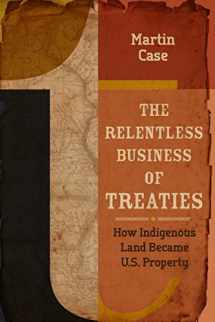
The Relentless Business of Treaties: How Indigenous Land Became U.S. Property
Book details
Summary
Description
The story of "western expansion" is a familiar one: U.S. government agents, through duplicity and force, persuaded Native Americans to sign treaties that gave away their rights to the land. But this framing, argues Martin Case, hides a deeper story. Land cession treaties were essentially the act of supplanting indigenous kinship relationships to the land with a property relationship. And property is the organizing principle upon which U.S. society is based.
U.S. signers represented the relentless interests that drove treaty making: corporate and individual profit, political ambition, and assimilationist assumptions of cultural superiority. The lives of these men illustrate the assumptions inherent in the property system–and the dynamics by which it spread across the continent. In this book, for the first time, Case provides a comprehensive study of the treaty signers, exposing their business ties and multigenerational interrelationships through birth and marriage. Taking Minnesota as a case study, he describes the groups that shaped U.S. treaty making to further their own interests: interpreters, traders, land speculators, bureaucrats, officeholders, missionaries, and mining, timber, and transportation companies.
Odds are, the deed to the land under your home rests on this system.


We would LOVE it if you could help us and other readers by reviewing the book
Book review



